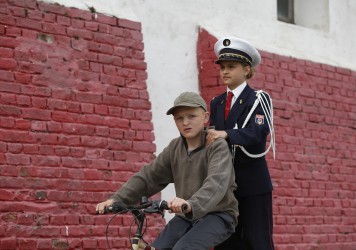It’s slapstick cannibal class war on the seaside from one of Europe’s most unique and consistently surprising directors.
Whatever happened to Bruno Dumont? After seven films that established his reputation as one of the most uncompromising and provocative filmmakers on the arthouse circuit, his 2014 miniseries P’tit Quinquin was a bewildering change of pace. It still looked and felt like a Dumont film, but the dour tone of his previous work had shifted into a lighter mode, and he displayed an unexpected gift for eccentric comedy.
P’tit Quinquin was something truly unique, a film that seemed to act as both a parody of his own ultra-serious work and an ambitious attempt to explore his usual themes in a fresh way.
But if you thought Dumont would revert to type after scratching his comic itch, think again. Slack Bay is pure slapstick. The tone is set early on with the appearance of two detectives, played by Didier Després and Cyril Rigaux, who bear an uncanny resemblance to Laurel and Hardy. The gap-toothed Després is so corpulent his every movement prompts squeaky sound effects, as if his joints are straining under pressure. And Dumont clearly recognises the time-honoured comic value of a fat man falling over – Després spends much of the film tumbling down sand dunes with his wide-eyed colleague scampering after him.
If this makes you laugh then settle in and enjoy the ride, because there’s plenty more where that came from. The film is almost 90 minutes shorter than P’tit Quinquin but it feels twice as full, with Dumont packing in as much weirdness as possible and pushing his actors to give the most over-the-top and cartoonish turns they can muster. Juliette Binoche sweeps into the picture as a shrieking, haughty grande dame (a million miles from Camille Claudel 1915, her previous collaboration with Dumont).
Meanwhile a hunchbacked Fabrice Luchini shuffles along behind her, muttering in a monotone drawl, and Valeria Bruni Tedeschi frantically makes sure everything is in its right place as Luchini’s wife. It’s an unusually starry cast for Dumont, but he uses them purposefully. These familiar faces play the self-absorbed, snobbish and condescending Van Peteghem clan, which has descended on this northern seaside resort for their annual holiday.
The rest of the ensemble consists of Dumont’s usual collection of non-professional actors, drawn from the local environs and cast for their distinctive looks and odd tics, which creates a clear class divide among the characters that works in the film’s favour. The mysterious disappearances of tourists is the result of the working class Brufort family killing and eating these upper-class interlopers.
Yes, even in Dumont’s later, funny ones there is no shortage of people being butchered, and Slack Bay’s tonal shifts, skilfully balanced over P’tit Quinquin’s four episodes, can sometimes be whiplash-inducing here. Aside from the pratfalls and the dismemberment, there’s a surprisingly tender romance between Binoche’s gender-swapping offspring Billie (played a by a striking newcomer named Raph) and the eldest son Ma Loute (Brandon Lavieville), but that strand of the film ultimately takes a jarringly brutal detour too.
Dumont just can’t help himself. Maybe he hasn’t changed that much after all? But when he is making films as singular, absurd and inspired as this, it’s easy to forgive the occasional misstep.
Published 17 Jun 2017
‘A Bruno Dumont comedy’ still sounds odd...
Pratfalls, cannibalism and levitation – there’s something for everyone.
Slack Bae.

By Anton Bitel
The high priest of gloom, Bruno Dumont, returns with a comedy which is part Jacques Tati, part Twin Peaks.

By Violet Lucca
The anguished face of Juliette Binoche is the emotional core of this harrowing study of an artist.

Finland’s Aki Kaurismäki responds to the refugee crisis in typically deadpan and affecting fashion.